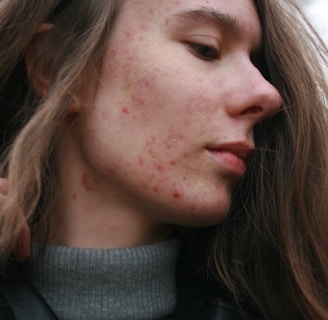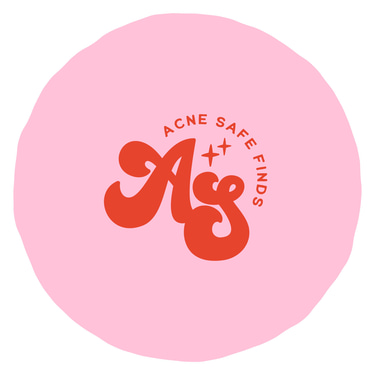What Is Acne, Really?
Let’s talk about acne. Most of us have dealt with it at some point whether it’s a full-blown breakout or the occasional pimple that shows up right before something important. But even though acne is super common, there's still a lot of confusion around what it actually is and why it happens. One thing I want to make super clear right away: acne is an inherited condition of the pore. It’s not your fault. If you’re dealing with breakouts, it doesn’t mean you’re dirty or doing something wrong.
7/18/20253 min read


So… What Is Acne?
Acne is basically a clogged pore that gets inflamed. It starts in your hair follicle (yes, even the tiny ones), which is connected to a little oil gland. That oil, called sebum, is totally normal and actually helps protect your skin. But when there’s too much oil, and dead skin cells don’t shed properly, it can create the perfect little plug.
Once the pore is clogged, bacteria can get trapped inside, and your body reacts with redness, swelling, and sometimes pus. That’s how you end up with all the different types of breakouts.
The Different Types of Acne
Not all acne looks the same. Here’s a quick breakdown:
Whiteheads – Pores that are clogged and closed off under the skin.
Blackheads – Pores that are clogged but open at the surface, which is why they darken.
Papules – Small, red bumps that are inflamed but don’t have a visible head.
Pustules – Like papules, but with pus at the surface (think of the classic “zit”).
Nodules & Cysts – These live deeper in the skin, can be painful, and usually take longer to heal.
You might’ve also heard of something called “fungal acne” (technically not acne, but it looks a lot like it!). That’s a whole separate thing caused by yeast overgrowth, and it needs to be treated differently. I’ll write more about that in another post.
What Causes Acne?
There’s no one single cause. Acne happens when multiple things come together at the wrong time. These are the main players:
Too much oil production
Clogged pores from dead skin
Bacteria buildup
Inflammation
But here’s something a lot of people don’t know:
Acne is actually an inherited condition.
If you’re prone to acne, it usually means you were born with pores that are more likely to get clogged. It runs in families so if your parents, siblings, or even cousins had breakouts, chances are you will too.
That’s why two people can use the exact same products and only one breaks out. It’s not about doing things wrong; your skin just needs different support.
Common Triggers That Can Make It Worse
Sometimes your acne isn’t just about what’s happening inside your body it can be triggered by things in your environment or routine too. Here are a few sneaky ones:
Pore-clogging ingredients in makeup or skincare
Shampoo and conditioner that drips onto your skin (yes, really!)
Dirty pillowcases, phone screens, or touching your face a lot
Over-washing or over-exfoliating your skin
Stress, which can mess with your hormones and oil production
Why It Helps to Understand Acne
When you understand what’s going on underneath your skin, it’s easier to be patient and consistent with your routine. Acne isn’t something you can “cure” completely because it’s an inherited skin condition, but it can be controlled.
With the right combination of acne-safe skincare, ingredient awareness, and some helpful lifestyle tweaks, most people can get clear and stay clear. It just takes the right plan and a little patience.
You’re not doing anything wrong. And no, your skin isn’t “gross.” It’s just trying to communicate with you. Once you learn how to listen, things get a lot easier.
You’re Not Alone in This
If you’re struggling with breakouts right now, please know you’re not the only one. Acne is a genetic skin condition, not a failure. And even though it can’t be “cured,” it can be managed, and clear skin is possible. I see it happen all the time.
You’re not broken. You just need the right tools, consistency, and support. I hope this post helped you understand your skin a little better.
Next up, I’ll be sharing more about how to tell what type of acne you have and how to treat it without making things worse. Stay tuned. 💛
Pore-Friendly Emails Only.
Subscribe for no-fluff skincare advice, acne-safe product drops, and insider tips from an esthetician who actually gets acne. No spam — just support.
